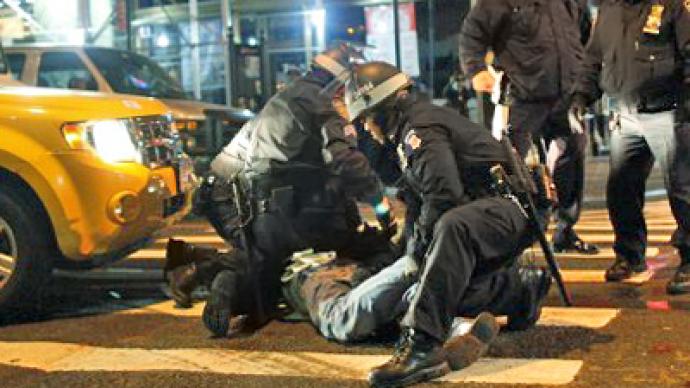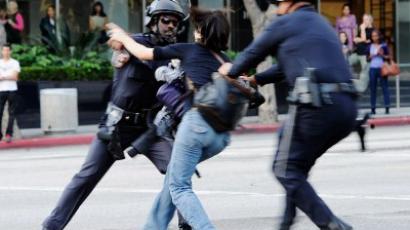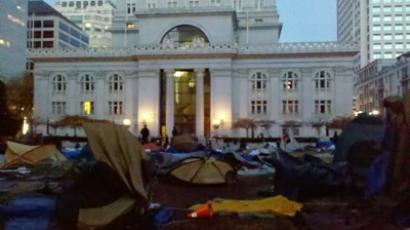Bloomberg’s office admits to arresting journalists for covering OWS

Arrests in the Occupy movement nationally have surpassed 1,000, with 177 being charged by the NYPD this Thursday in only the first few hours.
Now New York is admitting that journalists that they credentialed are among those that were cuffed by cops. In a statement to the press released from Mayor Michael Bloomberg’s Office on Thursday, November 17, spokesperson Stu Loeser addressed the media about reports relating to the growing number of journalists who have been arrested by the NYPD during Occupy Wall Street protests, a now-international movement which began in Lower Manhattan two months to the day of Loeser’s memo.“Like all of you, I’ve heard and read many reports of reporters who supposedly were wearing valid NYPD press credentials, yet allegedly encountered problems on the streets of New York,” writes the spokesman. Loeser goes on to direct recipients of the memo to a roster of reporters published by independent outlet The Awl that has chronicled the names and affiliations of journalists that have been arrested across the country so far, which as of this writing totals 26. “Not being familiar with many of the media outlets for which The Awl says these reporters work, I had the list of ‘26 arrested reporters’ checked against the roster of reporters who hold valid NYPD press passes,” Loeser adds. “You can imagine my surprise when we found that only five of the 26 arrested reporters actually have valid NYPD-issued press credentials.”With that sentence alone, Loeser manages to shoot himself in the foot. Twice.Given his statement, Bloomberg’s office has indeed confirmed that at least five members of the media that were accredited by the City’s own police force were arrested while doing their job, a job that the Police Department has acknowledged and authorized. Secondly, Loeser attempts to discredit the media while at the same time exposing that he didn’t do his homework himself.Maybe the reason that only five of the 26 reporters had NYPD-issued credentials was because not all of those 26 arrests occurred in New York.Loeser says he checked the list of arrested reporters, but in examining the roster of names published by the Awl, it would be hard to make sense of why someone like photojournalist Kristyna Wentz-Graff would have NYPD-issued credentials — given that her arrest occurred while covering an Occupy protest near the University of Wisconsin-Milwaukee, roughly 900 miles from Manhattan. The same could be said about reporter Jonathan Meador, who was apprehended by cops in Nashville, Tennessee for reporting from a Music City occupation back in October.It also opens up, of course, the argument of how free the free press actually is. Yesterday in New York, officers within the NYPD were filmed setting up blockades on the sidewalks of Manhattan, demanding identification from citizens to have access to public streets. As thousands rallied against corporate greed, NYPD officers were filmed ironically demanding corporate-issued building passes from New York workers so that they could have permission to walk certain routes, resulting in many protesters proclaiming that the City has been transformed into a literal Police State. Now it is clear that the right to walk the streets of New York is being eradicated by the NYPD while at the same time the First Amendment’s right to report is being completely ignored by the Police Department while they keep journalists from reporting from one of the biggest news events in the world at the moment. "American foreign correspondents routinely put themselves in harm's way to do their jobs, in some of the most brutal dictatorships in the world. And their NYC colleagues deserve the freedom to make the same choice," Manhattan Borough President Scott Stringer said in a statement earlier this month. "Zuccotti Park is not Tiananmen Square."As Occupy events continue to escalate in intensity, however, it seems as if Bloomberg’s tyrannical rule over New York is becoming more and more evident. Reports of journalists arrested during Thursday’s Day of Action have been unconfirmed so far, though RT’s own Lucy Kafanov says that she was struck by a police baton while reporting from New York and independent journalist Luke Rudkowski claims a plain-clothes officer punched him in the face for filming a demonstration. Others told reporters that the NYPD refused their credentials during protests, claiming them invalid yet threatening to revoke them at the same time. At a protest earlier in November, freelance radio journalist Julie Walker told the AP that cops ripped her recorder out of her hand. She was on assignment for National Public Radio at the time a few blocks from Zuccotti Park, the hub of the Occupy Wall Street on the East Coast. Doug Higginbotham from TV New Zealand added to the AP that he had his press ID stripped off him by the NYPD while covering protests this past Tuesday as well. “Ten years. Never been arrested,” said Higginbotham. “I covered 9/11.”Retired New York Supreme Court Judge Karen Smith adds that on Thursday's Day of Action, she was threatened with arrest herself while volunteering as a legal observer during the protests and was nearly assaulted by the NYPD."I was there to take down the names of people who were arrested," Judge Smith tells Democracy Now on Friday. "As I’m standing there, some African-American woman goes up to a police officer and says, ‘I need to get in. My daughter’s there. I want to know if she’s OK.’ And he said, ‘Move on, lady.’ And they kept pushing with their sticks, pushing back. And she was crying. And all of a sudden, out of nowhere, he throws her to the ground and starts hitting her in the head,” says Smith. “I walk over, and I say, ‘Look, cuff her if she’s done something, but you don’t need to do that.’ And he said, ‘Lady, do you want to get arrested?’ And I said, ‘Do you see my hat? I’m here as a legal observer.’ He said, ‘You want to get arrested?’ And he pushed me up against the wall.In Loeser’s statement from Thursday, he notes that of the five credentialed reporters arrested on Tuesday alone, two of them — Julie Walker of the AP and Patrick Hedlund of DNA Info — were charged with disorderly conduct for covering Occupy events. Walker writes that she was walking north on Broadway a few blocks from Zuccotti and recording street sounds when she was arrested. “The plastic handcuffs were so tight, they cut off the circulation in my hands and left cuts and abrasions on my wrists,” she tells The Root. To Police Commissioner Ray Kelly though, these arrests were justified. Kind of.To NY1 on Tuesday, Kelly said that reporters “didn't have a right to be there because there was confusion as to what they were allowed to do.” As it would be, however, Hedlund was actually arrested outside of the privately-owned Zuccotti Park, with an NYPD-issued pass.For the dozens more that are “confused,” there are thousands of NYPD officers who likewise aren’t sure of how to handle the situation. Journalists continue to be arrested with charges often being dropped. As yesterday’s Day of Action events made clear, however, the Occupy movement is only getting bigger and journalists, whether the NYPD wants to or not, will continue to report from the scene — with or without credentials.(And for those wondering how a reporter can obtain an official NYPD pass, The Observer notes that the qualifying factors require a journalist to prove that they covered six or more events in the city on separate days in the 24 months before asking for a pass — implying that in order to be valid in the eyes of the law, one must break it first.)














